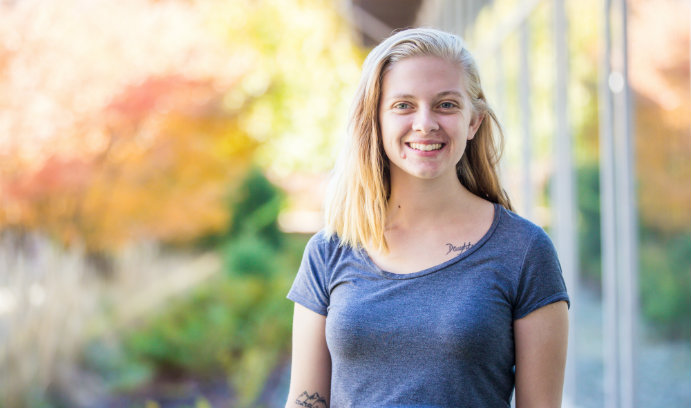Senior Helps Create a Greener Lehigh

Olivia Barz ’19 discovered her passion for the environment during her first year at Lehigh.
Olivia Barz ’19 came to Lehigh University planning to be a behavioral neuroscience major, but then her first-year roommate asked her to attend an Eco-Rep meeting. Eco-Reps are students who teach their peers in residence halls and Greek houses how to be more sustainable in their own rooms and throughout Lehigh through educational events and other opportunities. After learning about the sustainability efforts implemented on campus, Barz was immediately interested in getting involved.
As a result of her newfound passion for the environment, Barz changed to a double major in environmental studies and environmental science. She also has been putting her studies to practice at the university, in the Lehigh Valley and beyond.
Barz has been an Eco-Rep and part of the Office of Sustainability since she was a first-year student. She says she enjoys educating people at the university about the small ways students and faculty can make the campus more sustainable.
In addition to her efforts on campus, Barz is working on a project with other students that will check the sustainable levels of the offices of Permanent Missions to the United Nations in New York.
The program, titled Lehigh University Partnership for Sustainable U.N. Missions, started as a Mountaintop project in summer 2017. Barz joined the team this semester, and she is now participating in the continued program after demonstrating interest in the project and the environment. The team has partnered with Sustainable U.N. in Geneva, Switzerland, with whom they speak and share ideas through Skype calls.
According to the Greening the Blue website, Sustainable U.N. started in 2008 with people in Geneva, London, Stockholm and Nairobi. The group is involved in transforming all the United Nations organizations into more sustainable places.
The Lehigh University Partnership for Sustainable U.N. Missions project is preparing to launch its work in New York City-based Mission offices this semester.
“We’re creating a step-by-step process for the U.N. Missions to go through their offices to become more sustainable,” Barz says. “Last year, the (group) came up with the process and hopefully, this year, we’re going to be implementing it in a couple of the New York City-based Mission offices.”
Lehigh became a non-governmental organization to be part of the U.N. in 2004. The Lehigh-U.N. Partnership allows students to work closely with the U.N., including visiting the organization in New York where students can attend conferences and work with ambassadors.
The Lehigh University Partnership for Sustainable U.N. Missions project is still in its early stages. Before they can contact New York offices, Barz says, they have to finalize their list of questions that Missions will use to evaluate whether their office aligns with the U.N. 's Sustainable Development Goals.
Barz says the team is developing a website so the Missions can easily apply and have access to resource materials.
“I think it’s cool to go beyond Lehigh in sustainability efforts,” Barz says. “Up until this summer, all I’ve done with sustainability was on campus, which is cool, but it’s nice to go beyond that.”
Outside of the university, Barz participated this past summer in local sustainability efforts through the non-profit organization Alliance for Sustainable Communities-Lehigh Valley in Bethlehem.
Barz worked with a team to create a sustainability impact assessment of the proposed Da Vinci Science City in Easton, Pa. The museum will be an expansion to the Da Vinci Science Center, a children’s science museum and non-profit organization in Allentown, Pa. Barz met with and presented findings to professionals including the Da Vinci Science Center’s CEO and the mayor of Easton.
Recognizing her dedication and support, the leadership of the Alliance for Sustainable Communities-Lehigh Valley asked Barz to work on another project in fall 2018. She is working with local breweries to see how they can reduce energy, water usage and other actions that impact the environment.
Barz says it is easy for students to get involved with the Office of Sustainability and other green efforts: The office's website has information on becoming involved and ways to be more conscious of how actions can affect the environment.
It is easy for other offices at Lehigh to work with the Office of Sustainability, Barz says. Lehigh departments can participate in the Sustainable Office Program to check how sustainable they are. After following the different certification steps, offices can receive a certification of bronze, silver, gold or platinum, depending on the number of sustainable actions they complete. Barz says the offices typically have to make changes before getting certified. Similarly, students can also get their residence hall and Greek house rooms certified by Eco-Reps.
After graduation, Barz hopes to get a job involving her studies, particularly in urban and city planning.
Story by Madison Hoff ’19
Photos by Christa Neu
Posted on:





